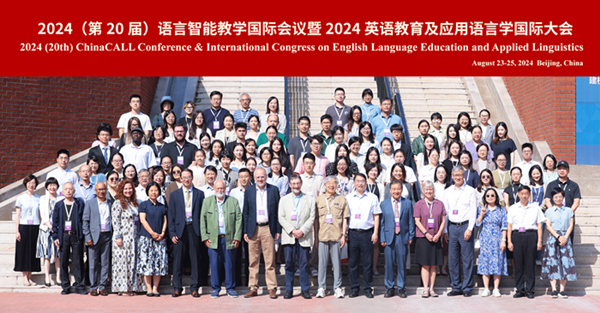- Research
- Research Centers
- Journals
- Admission
- Introduction
- Programs
- Application
- Alumni & Giving
- Alumni Club
- Giving
The 2024 (20th) ChinaCALL Conference & International Congress on English Language Education and Applied Linguistics took place at Beijing Foreign Studies University (BFSU) from Aug 23 to 25.
Hosted by the Computer-Assisted Language Learning Association, China Association for Comparative Studies of English and Chinese (ChinaCALL), the event brought together nearly 200 scholars from 68 domestic universities and 11 countries.

Participants pose for a group photo at the 2024 (20th) ChinaCALL Conference & International Congress on English Language Education and Applied Linguistics. [Photo/bfsu.edu.cn]
Addressing the opening ceremony, Ding Hao, a member of the standing committee of the CPC BFSU committee and vice-president of the university, highlighted the university's role as a pioneer in integrating technology into language education and learning. He emphasized the university's commitment to leveraging digital technology to enhance educational quality and promote fairness, diversity and inclusiveness in education.
The educational practices of BFSU’s Beiwai Online had been recognized as the world’s only case study in the higher education sector incorporated into ISO/TR 29996 standard, Education and Learning Services – Distance and Digital Learning Services (DDLS) – Case Studies, in January this year, according to Ding.
He encouraged participants to exchange ideas and research findings and advance the digital transformation of global language education.
Gu Yueguo, chairman of ChinaCALL and honorary dean of BFSU's Beiwai Online, reflected on the evolution of Computer-Assisted Language Learning (CALL) in China. He emphasized the need to focus on the humanistic aspects of technology and avoid overemphasizing its role at the expense of human agency, especially in the era of generative AI.
Eight keynote speeches were delivered at the conference, covering topics such as GeronticCALL, critical digital literacy, Hong Kong’s trilingual education and the significance of context for understanding the patterns of vocabulary and grammar. The speakers also covered the potentials and implications of CALL, social justice and a capability approach for research and praxis, the role of English in Asia’s expanding circle countries, post-pandemic online language teaching and learning with generative AI technologies and the design of multimodal tasks for language learners, emphasizing the frameworks and competencies needed in the digital era.
The conference also included a thematic seminar on human-centered educational technology, 86 parallel presentations in 18 sub-forums and an academic roundtable forum.